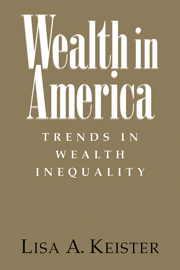Book contents
- Frontmatter
- Contents
- Preface
- PART I INTRODUCTION
- PART II WEALTH DISTRIBUTION
- PART III WEALTH ACCUMULATION
- 7 The Impact of Social and Economic Trends on Inequality
- 8 Families and Wealth Inequality
- 9 Wealth Mobility
- 10 Conclusions and Implications
- Appendix: Research Design and Measurement Issues
- References
- Index
10 - Conclusions and Implications
Published online by Cambridge University Press: 23 December 2009
- Frontmatter
- Contents
- Preface
- PART I INTRODUCTION
- PART II WEALTH DISTRIBUTION
- PART III WEALTH ACCUMULATION
- 7 The Impact of Social and Economic Trends on Inequality
- 8 Families and Wealth Inequality
- 9 Wealth Mobility
- 10 Conclusions and Implications
- Appendix: Research Design and Measurement Issues
- References
- Index
Summary
Wealth is a sacred trust which its possessor is bound to administer for the good of the community.
(Andrew Carnegie)If a man is proud of his wealth, he should not be praised until it is known how he employs it.
(Socrates)I began this volume with a discussion of the importance of wealth as an indicator of social and economic well-being. I observed that while current income can certainly be used to gauge advantage, the ownership of wealth has long separated the truly advantaged from the rest of the population. Social standing, political influence, and, of course, financial security all increase with wealth. Even a relatively small amount of savings can ensure against extreme financial hardship if a family faces the loss of a primary income earner, a major medical expense, or another relatively extreme financial crisis. Yet there is evidence that most families have very little savings. Indeed, empirical evidence from wealth surveys that resumed in the early 1980s, after many years in which they were not conducted, began to provide evidence that inequality of wealth ownership is much more extreme than income inequality. Despite this evidence, social scientists have focused almost exclusively on income in studies of social and economic inequality and related studies of lifetime patterns of mobility. While there is definitely a direct relationship between income and wealth, there is substantial variation in the two measures that suggests that part of the story of well-being is missing in studies that deal with income alone.
- Type
- Chapter
- Information
- Wealth in AmericaTrends in Wealth Inequality, pp. 259 - 270Publisher: Cambridge University PressPrint publication year: 2000



